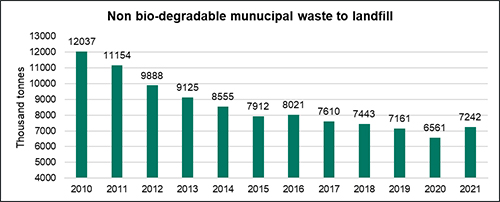The latest statistics from DEFRA suggest that every UK household is producing nearly a tonne of waste every single year, according to analysis by global circularity experts Reconomy.
The data shows that in 2021, households in the UK produced 27.7 million tonnes of waste. With the ONS data2 suggesting there are 28.1 million households in the UK it suggests that every household is responsible for producing nearly a tonne of waste – 984kg – every year.
The recycling rate dipped to 44.6% in 2021 compared to recent years. It means 15.3 million tonnes of waste from households is not being recycled – around 545 kg tonnes of waste per household ever year.
Harvey Laud, Director, Reconomy, commented, “These statistics are another reminder of the huge volumes of waste produced throughout the nation every single year. From households to big businesses, we all have a part to play in managing this output throughout the waste hierarchy – from prevention to recovery and disposal. Innovations like reverse vending, increased awareness of the importance of recycling and reuse as well as the growing scrutiny over sustainability should drive further progress over the coming years.”
The DEFRA statistics also show a worrying increase in non-biodegradable municipal waste ending up at landfill, after a consistent downward trend over the past decade. Non-biodegradable waste to landfill decreased from 12.0 million tonnes in 2010 to 6.6 million tonnes in 2020. However, this increased to 7.2 million tonnes in 2021.
Laud commented, “Throughout the waste hierarchy we want to see further progress from households and businesses to avoid an increase in materials ending up at landfill. Evidently, given its fundamental impact on our daily lives, the pandemic will have had a significant impact on these figures. Spending more time at home and keeping consumption in-house could have led to a far higher proportion of non-biodegradable waste being created within households. It is an area we will be watching closely in next year’s figures. Ultimately, the preservation of our finite resources is critical to the transition to a circular economy and managing household waste is an important aspect of that given it accounts for over 10% of the UK’s total waste.”




